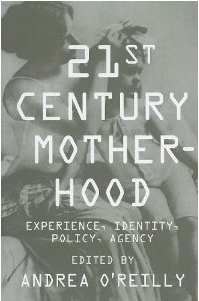Twenty-first Century Motherhood: Experience, Identity, Policy, Agency

Motherhood is often a topic of confusion or contention among feminists. The process of birthing demonstrates just how awesome and powerful women’s bodies are. However, the institution of motherhood is constructed in ways that oppress women and privilege certain classes, races, and sexualities. In Of Woman Born Adrienne Rich writes, “We do not think of the power stolen from us and the power withheld from us in the name of the institution of motherhood.”
Taking their cue from Rich, writers of the new volume Twenty-first Century Motherhood: Experience, Identity, Policy, Agency look to reclaim some of this stolen and withheld power. This volume, which explores current issues in the burgeoning field of motherhood studies, shows how women have begun deconstructing motherhood through the practice of “empowered mothering” that has transformed this institution. Editor Andrea O’Reilly’s introduction to the volume gives readers a clear and succinct foundation of feminist theories surrounding motherhood studies including Sara Ruddick’s revolutionary idea that mothering is a practice and therefore a verb as opposed to a noun.
While O’Reilly’s introduction is much needed for motherhood studies amateurs such as myself, the essays in Twenty-first Century Motherhood range much further than a mere introduction to this exciting field. This volume, true to its title, explores how recent changes have altered forever the experience of mothering for women everywhere. The essays are divided into four sections— experience, identity, policy, and agency—and cover a huge range of topics which seem to particularly affect mothers in the Global North. The articles range, quite incredibly, from Chicana mothering and GBLTQ parenting to the role that the internet and biotechnology play in familial relations.
I was pleasantly caught off guard by Ana Villalobos’ thought-provoking essay, “Mothering in Fear: How Living in an Insecure-Feeling World Affects Parenting.” Villalobos does an excellent job exploring the question: what mothering strategies do parents use in reaction to today’s perceived fear and risk-abundant environment? Villalobos shows that while some mothers have become overly protective, others have developed inoculating parenting behaviors—exposing their children to the risks of the world. While these parents have often been criticized as lacking an intense love and care for their children, Villalobos shows that just the opposite is true. These inoculating parents believe that by exposing their children to moderate, but manageable, risks they are better caring for their children by allowing them to learn how to navigate such a complex and dangerous world.
In “Brown Bodies, White Eggs,” Harrison touches on some very pertinent issues surrounding race and labor in matters of cross-racial gestational surrogacy, when the surrogate female giving birth is of a different race than the child she is carrying. In her essay, Harrison proposes that while the inter-relations of people of different races in this process of birthing may seem to efface racialized gender hierarchies they actually do much more to enforce them.
Lastly, I was quite impressed with Rachel Epstien’s essay, “Queer Parenting in the New Millennium.” Toward the end of her essay, Epstien poignantly comes to the difficult question: how do queer parents obtain both the public recognition they desire as lovers and parents while at the same time persist in resisting the norm and questioning that which society sees as recognizable? In answer to this question, Epstien writes, “let our children learn that “sexuality and gender are varied, fluid, complex, messy, exciting, scary, fun and always changing.” Epstien here makes an excellent point. At the end of Twenty-first Century Motherhood however, it is easy to see that along with sexuality and gender, motherhood should also be taught as “varied, fluid, complex, messy, exciting, scary, fun, and always changing.”